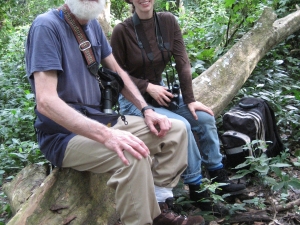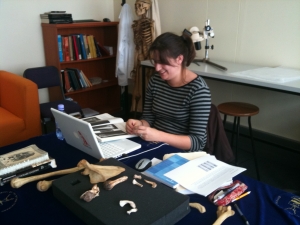Lead Author Learned to Love Research at Duke
When Bob Cieri first arrived at Duke, he envisioned becoming an ecologist who worked in the field, not someone who’d flourish in a lab.
All that changed during his four years at Duke. Now, three years out and happily ensconced in his first year of graduate school in biology at the University of Utah, Cieri recently was lead author on a published study that started as his honors thesis at Duke. The study theorizes that human society advanced when testosterone levels dropped and people started being more cooperative.
The Connecticut native said he is grateful for his undergraduate experience, adding that it was made possible by financial aid.
“I was interested in research, but I also wanted to go to a liberal arts school,” said Cieri, who graduated in 2011. “Duke offers both – a good college feel and a sheltered liberal arts community, as well as access to the many opportunities offered at a major research university. I almost finished a music minor. I played in the orchestra and sang in chapel choir all four years.”
His first research gig at Duke involved a “mostly-failed” cognition test on songbirds in the lab of biology professor Steve Nowicki and his wife Susan Peters, an expert in birdsong learning and development.
“Sometimes you can learn more from your failures than your success because they often mean you are approaching the problem in the wrong way,” Cieri said. “When an experiment fails, you're forced to try something new, often leading to a discovery you didn't in any way anticipate. I also gained confidence that I was dogged enough to have a chance at a research career.”
Cieri said he benefitted from the personalized form of education at Duke that allowed him to get to know scientists and the craft of research.
A class about hunter-gatherers taught by Professor Stephen Churchill, a human paleontologist, really sparked his interest. Halfway through his junior year, Cieri began making simple measurements of the fossil record and found changes in skull shapes that roughly corresponded with the emergence of advanced tools and symbolic art. He measured many of the older skulls himself, and then relied on a published paper for the measurements of 20th Century skulls.
Cieri went on to major in biology and anthropology and to do an honor thesis, with Churchill as his advisor. “I got an A-to-Z idea of what doing research is like,” Cieri said.
Cieri studied for a summer at the Duke Marine Lab and for another stint at the Organization of Tropical Studies in South Africa on savannah ecology. After Duke, he spent several months working for a research group in the Galapagos Islands and then worked for a year in the Utah lab, helping with experiments and an outreach program for blind students before deciding to start a doctoral program.
“I don’t think research is for everybody, but you don’t know until you do it,” Cieri said. “You have to be the kind of person who is motived to answer questions and get kind of obsessed like I do. I liked the way scientists work.”




